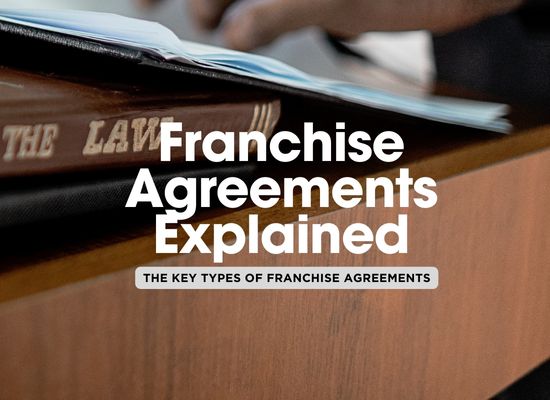Top 10 Franchise Agreements Explained Quickly

Franchise agreements are the foundation of the franchisor-franchisee relationship, defining the rights, obligations, and operational frameworks for both parties. While most people are familiar with the standard single-unit agreement, there are various types designed to suit different business needs and growth strategies. Whether you’re a new franchisee or an expanding franchisor, understanding these agreements is crucial to ensuring the success of your franchise venture.

Disclaimer: This article is for informational purposes only and does not constitute legal or financial advice. Consult a qualified professional for guidance tailored to your specific situation.
1️⃣ Single-Unit Franchise Agreement
The single-unit franchise agreement is the most straightforward and commonly used type. It grants the franchisee the right to own and operate one location of the franchise. This agreement outlines the terms for that single unit, including operational guidelines, fees, and the franchisor’s support.
- Who It’s For: Entrepreneurs looking to start small, first-time franchisees, or those who prefer managing just one location.
- Key Features:
- Limited to one location.
- Clearly defined territory (if applicable).
- Basic training and operational support from the franchisor.
- Example Use Case: A first-time business owner opening a single fast-food franchise location in their hometown.
2️⃣ Multi-Unit Franchise Agreement
A multi-unit franchise agreement allows a franchisee to open multiple locations under one agreement. The franchisee commits to developing a specific number of units within a defined time frame, usually in an exclusive territory.
- Who It’s For: Experienced entrepreneurs or investors with the resources and expertise to manage multiple locations.
- Key Features:
- Rights to open and operate multiple units.
- Typically involves an exclusive development area.
- A schedule or timeline for launching the additional locations.
- Example Use Case: A seasoned franchisee securing the rights to open five coffee shop locations in a major metropolitan area over the next three years.
3️⃣ Area Development Agreement
An area development agreement is similar to a multi-unit franchise agreement but goes a step further. It grants a franchisee the exclusive rights to develop multiple franchise locations within a specific geographic area over a set period. The franchisee typically operates as an area developer rather than managing each individual location.
- Who It’s For: Entrepreneurs or organizations capable of handling large-scale franchise operations and market development.
- Key Features:
- Exclusive development rights in a specified region.
- A binding development schedule.
- May include sub-management of the franchisees in the area.
- Example Use Case: A company securing the rights to develop 10 fitness centers across an entire state over the next five years.
4️⃣ Master Franchise Agreement
The master franchise agreement grants the franchisee (often called a master franchisee) the right to not only open multiple locations but also sub-franchise to others within a designated territory. This makes the master franchisee a mini-franchisor, responsible for recruiting, training, and supporting new franchisees in their region.
- Who It’s For: Investors or businesses with extensive franchise experience and resources to manage a larger network.
- Key Features:
- Authority to sub-franchise within a region.
- Responsible for local marketing, training, and support.
- Typically requires a higher investment and more operational expertise.
- Example Use Case: A business group securing the rights to develop and sub-franchise a popular restaurant chain in an entire country.
5️⃣ Conversion Franchise Agreement
A conversion franchise agreement allows an existing independent business to become part of a franchise system. The business adopts the franchisor’s branding, operational standards, and systems, benefiting from the franchise’s established reputation and support.
- Who It’s For: Independent business owners looking to leverage a franchise’s brand and resources to grow their business.
- Key Features:
- Converts an existing business into a franchise unit.
- Often includes rebranding and adopting franchise standards.
- Provides access to franchisor marketing, training, and supply chains.
- Example Use Case: A local plumbing business joining a national franchise network for increased market reach and operational support.
6️⃣ Area Representative Agreement
An area representative agreement allows an individual or entity to act as a representative for the franchisor in a specific territory. Unlike a master franchise agreement, the area representative doesn’t sub-franchise but instead assists the franchisor with recruiting and supporting franchisees in the area.
- Who It’s For: Experienced professionals who want a hands-on role in franchise development without owning multiple locations.
- Key Features:
- Acts as an intermediary between the franchisor and franchisees.
- Earns commissions or fees for recruiting and supporting franchisees.
- Doesn’t own the individual franchises.
- Example Use Case: A business consultant partnering with a franchisor to help expand a franchise system across a specific region.
7️⃣ Sub-Franchise Agreement
A sub-franchise agreement operates under a master franchise agreement, where the master franchisee grants sub-franchise rights to others within their designated territory. The sub-franchisee operates their location while following the master franchisee’s guidelines, which align with the original franchisor’s standards.
- Who It’s For: Entrepreneurs who want to own and operate a single franchise location within a larger master franchise region.
- Key Features:
- Operates under the master franchisee’s oversight.
- Follows both master franchisee and original franchisor guidelines.
- Provides localized support via the master franchisee.
- Example Use Case: An individual opening a single bakery location within a city managed by a master franchisee for a national chain.
8️⃣ Joint Venture Franchise Agreement
A joint venture franchise agreement involves a partnership between the franchisor and the franchisee, where both parties share ownership and responsibilities for the franchise location. This structure is often used in international markets or unique circumstances requiring the franchisor’s direct involvement.
- Who It’s For: Franchisors looking to expand into challenging markets or franchisees who bring unique expertise or resources to the table.
- Key Features:
- Shared ownership between franchisor and franchisee.
- Joint responsibilities for operations and profits.
- Often used for international or experimental markets.
- Example Use Case: A franchisor partnering with a local investor to open a flagship restaurant in a foreign country, sharing profits and operational decisions.
9️⃣ Licensing Agreement
A licensing agreement is sometimes used as an alternative to a traditional franchise agreement. In this model, the licensor grants the licensee the right to use their brand name, trademarks, and certain proprietary systems without the full operational framework of a franchise.
- Who It’s For: Businesses or individuals seeking to leverage an established brand without the rigid structure of a franchise.
- Key Features:
- Rights to use branding and trademarks.
- Typically less comprehensive than a franchise agreement.
- May not include operational or training support.
- Example Use Case: A retailer licensing a clothing brand’s name to sell its products without adopting the brand’s operational standards.
🔟 Product Distribution Franchise Agreement
In a product distribution franchise agreement, the franchisee is granted the rights to distribute the franchisor’s products. Unlike traditional franchise agreements, the focus is primarily on product sales rather than operational processes.
- Who It’s For: Businesses or entrepreneurs specializing in sales and distribution.
- Key Features:
- Rights to sell franchisor products.
- Often used in industries like automobiles, beverages, and fuel.
- Minimal emphasis on brand operational control.
- Example Use Case: A dealership selling cars from a major manufacturer under a product distribution agreement.
Table Summary
| FranchiseDev: Top 10 Franchise Agreements | ||
| Type of Agreement | Key Features | Best For |
| Single-Unit Franchise Agreement | Grants the right to operate one location with defined terms like fees, training, and support. | First-time franchisees or those focusing on one business location. |
| Multi-Unit Franchise Agreement | Allows the franchisee to open multiple units within a set timeframe, often in a specific territory. | Experienced franchisees or investors looking to scale operations. |
| Area Development Agreement | Grants exclusive rights to develop multiple locations in a geographic area with a required development schedule. | Entrepreneurs with resources to handle large-scale franchise operations. |
| Master Franchise Agreement | Allows the franchisee to sub-franchise to others within a territory, effectively acting as a mini-franchisor. | Experienced business owners capable of managing franchise networks. |
| Conversion Franchise Agreement | Enables an independent business to join a franchise system, adopting its branding and standards. | Existing business owners looking to benefit from franchise resources and recognition. |
| Area Representative Agreement | Appoints a representative to recruit and support franchisees in a specific region without direct ownership. | Professionals interested in franchise development without managing locations. |
| Sub-Franchise Agreement | Grants a franchisee the right to operate a single unit under a master franchisee’s oversight. | Entrepreneurs looking for local opportunities within a master franchise territory. |
| Joint Venture Franchise Agreement | Creates a partnership between franchisor and franchisee, sharing ownership and responsibilities. | Franchisors entering new markets or franchisees with unique resources. |
| Licensing Agreement | Grants rights to use a brand name and trademarks without the full operational framework of a franchise. | Businesses wanting to leverage a brand without extensive franchisor involvement. |
| Product Distribution Franchise Agreement | Focuses on selling franchisor products rather than adopting operational processes. | Entrepreneurs specializing in product sales and distribution. |


